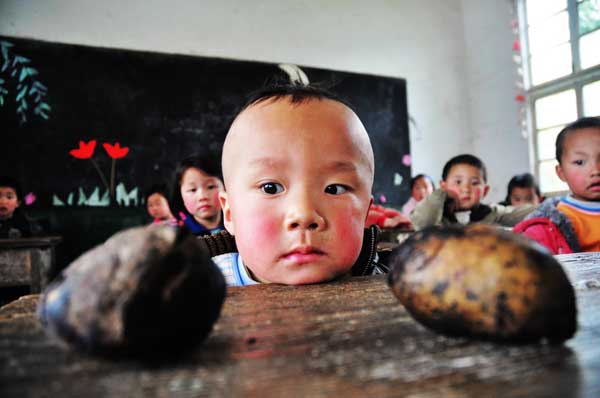Society
Rural schools get free meals
By Qiu Bo and He Dan (China Daily)
Updated: 2011-06-02 08:37
 |
Large Medium Small |
 Peng Yi, 5, stares at two sweet potatoes on his desk at the primary school in Dapingpo village of Xinhuang county, in Hunan. Before the start of the free lunch program, his lunch had often consisted of two potatoes. Photos by Wang Lisan and Xu Kangping / for China Daily
|
Deng, who has more than 24,000 followers on Weibo.com, was confident micro-blogging would offer a good way to raise money for charity because it ensured information could be dispersed in a transparent and efficient manner.
In the end, he decided the money raised should go to the Shaba primary school in Huaxi town, Qianxi county. The free lunch program officially began on April 2; since then, the 169 students at the school have been enjoying hot school lunches.
The campaign has so far proceeded in this manner: In accordance with an agreement reached between Deng's group and the local department of education, the volunteer group transfers the money needed to pay for students' lunch expenses through an appointed public charity fund to the local bureau that is in charge of monitoring the spending. Local officials and schools then work to ensure the program is running efficiently and to guarantee the safety of the food.
"The initial 20,000 yuan ($3,080) has been released and it helped students at the Shaba primary school get free lunches in April," said Li Jianhua, head of the education department in Huaxi town.
According to Li's calculations, a free lunch consisting of tofu, green vegetables, potatoes and a generous supply of rice costs 2.3 yuan for each student. "Considering the additional labor cost and electric fees, this will cost about 100,000 yuan a year for this school," he said.
"We understand it's our responsibility to be careful in putting this program into effect and that we must also ensure the safety of the food."
Yang Xun, a 34-year-old local, now find herself in the role of a cook. The school hired her through a job notice and pays her 800 yuan a month.
Yang confirmed that she buys basic foods from the town each week. She said the contents of the free lunches differ from day to day.
"They required me to obtain a health certification from the local health authority," she said.
"As long as there are students studying in Shaba school, the program will never end."
Elsewhere, Hongban primary school has reached an agreement with Liang Shuxin, a marketing planner at Tianya community, and his volunteer group.
Liang opened an online charity store at Taobao.com, which called on netizens to give money online to help the students obtain free lunches. He deemed 5 yuan to be the price of a "unit of love" and has since sold 85,000 units. By the end of May, he had received donations worth more than 430,000 yuan.
"Many kind-hearted donors gave 5 or 10 yuan," Liang said. "That may not seem like a lot to them, but it's an extraordinary contribution to the children."
Meanwhile, the goal of Deng Fei's program during the next five years is to give free lunches to students in 100 rural primary schools throughout China.
So far, Deng's campaign has raised more than 11 million yuan and helped students in 23 primary schools in Guizhou, Guangxi, Hunan, Yunnan, Guangdong and Henan.
"We hope the government will take over this responsibility and enable all rural students to enjoy a free school lunch," Deng said.
Earlier this year, the county's education department started a project aimed at ensuring that students who bring their lunches to school can enjoy hot meals.
"We have provided each primary school with heating devices and made sure there is a supervisor helping the kids heat the food," said Long Shengyong, an official with the education department.
"The essential thing in guaranteeing all pupils in the county have a lunch is to persuade the kids' parents to prepare lunches for them," he said. "But many people don't want to take our advice."
Xu Mei, spokesperson with the Ministry of Education, released a group of figures at a press conference in February, saying about 12 million students in the middle and western parts of China are now benefiting from a project aimed at ensuring that students have a nutritious diet.
| 分享按钮 |